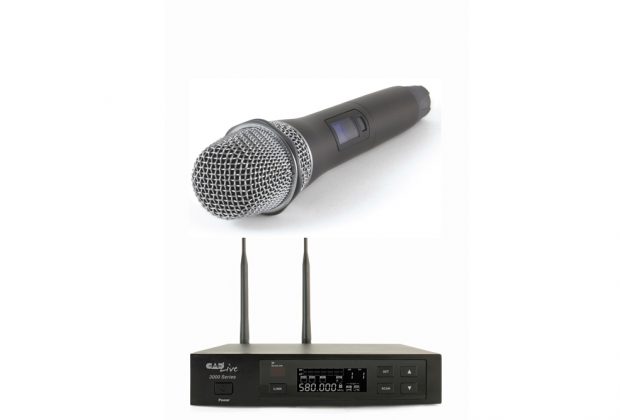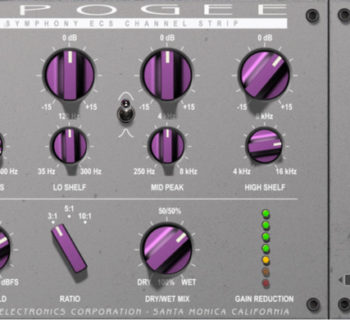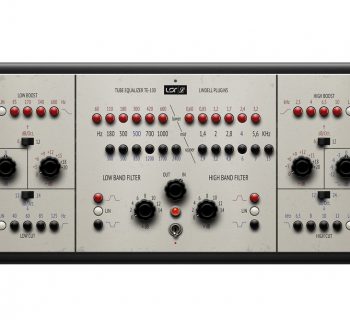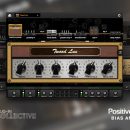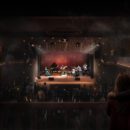The WX3000 is a handheld wireless microphone system and part of the new CADLive Series that couples the Equitek studio heritage with CAD's live sound prowess.
The CADLIve 3000 series come in two variants. The WX3000 ($599) is an all-metal CADLive handheld microphone transmitter with CAD's D90 super cardioid dynamic capsule. The WX3010 ($649) CADTone™ bodypack transmitter has both a hi-impedance instrument (guitar) input and low impedance mini-XLR input for Equitek's E19 earworm and E29 lavaliere mics (included).
Both of these systems come with a half-rack space, True Diversity receiver that was an absolute breeze to setup and configure using the high contrast LCD displays on both the transmitter and receiver.
I received the WX3000 system for review and I started my setup with the receiver configuration. The receiver is in an all-metal cabinet and comes with detachable single/dual rack ears--either a single receiver or two placed side by side would fit in a single rack space. A BNC extension kit with cabling for remotely mounting the antennas is also included.
The receiver has all its controls accessible on the front panel using familiar up/down buttons. It uses two antennas for True Diversity operation to minimize multipath interference--the receiver's display shows instantaneously which antenna is active with the strongest signal. I also liked the CADLock™ Automatic Tone Encoded Squelch that mutes out unwanted signals on the two UHF bands these systems operate. The WX3000 operates on the R band from 580 to 600MHz or the N band from 500 to 525MHz.
Both the receiver and transmitters are frequency agile. The first step in the process of setting up is to power up the receiver and let it do an environmental frequency analysis called ScanLink™. A clear frequency channel is found that is clear in your location and a particular time of day.
Once the ScanLink feature has selected a clear operating frequency, you're ready to sync or "pair" the handheld mic transmitter by allowing its IR Node (inside of the battery compartment) to "see" the receiver's front panel IR Node. The receiver will send the current operating frequency to the transmitter over this infrared path. This wireless system technology is now a necessity--a fact of life--especially in crowded metropolitan areas and in venues with many other wireless microphones, in-ears and body packs all operating at the same time.
Other parameters remotely settable are: transmitter RF output power levels in 10, 30 and 50-mW steps and microphone Gain--important for loud singers who love to eat the mic! The receiver's display also shows: RF signal strength, audio level, and squelching with the ability to set it tight enough to eliminate adjacent channel interference. The receiver also indicates the channel group, channel and actual operating frequency.
The receiver's rear panel has the two BNC jacks for the included 50-ohm 'rubber ducky' antennas, balanced XLR output and 1/4-inch unbalanced audio output jacks plus a power socket for the included wall-wart power supply. The handheld and bodypack transmitters also include SoftTouch™ multi-function On-Off/Mute switches and the CADLive bodypack transmitters are equipped with CADTone™ circuitry for accurate reproduction of high impedance guitar pickups and low impedance mic inputs.
Lastly, you can use up to 15 systems per frequency band at a venue. Other specifications are: dynamic range is specified at greater than 110dB, the transmitter's two AA batteries last up to 15 hours, and frequency response is rated at 40Hz to 15kHz.
Just an awesome kit I tried here in North Hollywood, CA. No problem getting great operation in about a 250-foot radius of my studio building. All amazing to me as at the end of my street are two cell towers, the NoHo police station, and numerous possibly interfering radio sources!
Check out: cadaudio.com/products/cad-live/wx3000.
BARRY RUDOLPH is a recording engineer/mixer who has worked on over 30 gold and platinum records. He has recorded and/or mixed Lynyrd Skynyrd, Hall & Oates, Pat Benatar, Rod Stewart, the Corrs and more. Barry has his own futuristic music mixing facility and loves teaching audio engineering at Musician’s Institute, Hollywood, CA. He is a lifetime Grammy-voting member of NARAS and a contributing editor for Mix Magazine. barryrudolph.com

